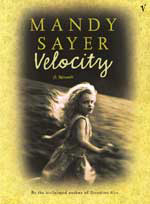The phrase "child abuse' kept itself in my mind as I read Velocity, the early childhood memoir of Australian author, Mandy Sayer.
The book is a prequel to Dreamtime Alice, the account of Sayer's adventures as a young adult, and is valuable in explaining the way Sayer's life has unfolded thus far. It is also a good read; compelling, uncomfortable, vivid.

In her acknowledgements, Sayer thanks her playwright husband, Louis Nowra, who "threatened to steal the stories herein and use them in his own work if I didn't write them down."
Velocity contains delicious material for fiction. Sadly Sayer's life is not fiction. The life she knew as the youngest child of Gerry and Betty, two hard-drinking bohemians who live for a good time, are more than any child should be asked to endure.
Moving from house to house, from school to school, life for Mandy and her siblings depended on how things were between her parents; was her father working (he was a mostly-out-of-work musician), were they fighting with each other, were they making up, how much were they drinking?
It is so easy to see that the Sayers were not doing well as healthy role models of good, clean living. Yet an honest reading of the book will remind of us others we know, perhaps even ourselves, who are less than stellar in the parenthood universe, sometimes exposing our children to the evils of this fallen world and expecting them somehow to parent themselves.
The shaky Sayer marriage ended and, with Gerry's loving arms out of reach, Mandy was prey to the unsavoury men her mother attracted as an antidote to her own loneliness and powerlessness.
The pain we inflict on our children is highlighted through the abuse and degradation of Betty's union with one particular man, bearing a history of being abused himself. The woman's negligence in exposing her child to this violence is very clear and not lost on the author.
Sayer survived, of course, and became a prolific and respected writer. Like many children of abuse, she was armed with quick wits and a resourcefulness beyond her years.
She took comfort in literature and her own writing, which provided a haven from the madness that surrounded her and became one of the few constants in an otherwise itinerant life. I've no doubt it was all good for her development as an artist but at what price?
In a very real way, the sins of the father (and mother) are visited on the next generation, begging the question, "How many of Sayer's parents' mistakes will she have to repeat before finding a way of undoing the damage they have allowed her to sustain?"
As for our own children, what legacy are we passing on? Are they growing up injured by the fallout of careless decisions, as we drag our kids with us into bad relationships, clouded by dodgy values and the flimsiness of material wealth?
Will they know and recognise the loving arms of the Father who will never let them down, knowing them intimately, and accepting and loving them all the more?
Sayer's memoir reminds us that children desperately want to believe good things about their parents. We might have a blighted record so far, but now is a great day to change things for the better.

























